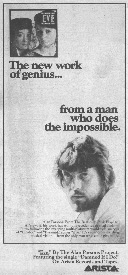![]()
  |

Eve
The Alan Parsons Project
Arista 9504
Released: September 1979
Chart Peak: #13
Weeks Charted: 27
Certified Gold: 2/11/80
 The year's silliest record by a best-selling act, Eve purports to be a song cycle evoking Woman, yet the portrait thrown up by this 3-D space-rock oratorio is some whory Victorian witch in a leather headdress flicking her garter belt and hissing curses. "I'd rather be a man than sin my soul like you do," announces David Paton, playing one of the LP's four male accusers. "You lie down with dogs, you get up with fleas," spits another. That about sums up Eve's sexual politics. When it's finally Woman's turn to reply -- Woman gets only two cuts to Man's four -- she's made to whine about being lonely.
The year's silliest record by a best-selling act, Eve purports to be a song cycle evoking Woman, yet the portrait thrown up by this 3-D space-rock oratorio is some whory Victorian witch in a leather headdress flicking her garter belt and hissing curses. "I'd rather be a man than sin my soul like you do," announces David Paton, playing one of the LP's four male accusers. "You lie down with dogs, you get up with fleas," spits another. That about sums up Eve's sexual politics. When it's finally Woman's turn to reply -- Woman gets only two cuts to Man's four -- she's made to whine about being lonely.
On 1977's witty I Robot, the Alan Parsons Project's bombastic and synthesized orchestral pop rock proved to be a nifty idiom for exploring man-machine myths. But the more human the theme, the more inappropriate such a style becomes. And how much more human can you get than a concept album, concerned with sex? Though Eve offers plenty of sonic grandeur -- the forceful melody of "Damned if I Do," the Beach Boys-like vocal harmonies in "Secret Garden" -- the lyrics are almost clumsy and sententious enough to give sex a bad name.
 Click for larger view. |
- Stephen Holden, Rolling Stone, 12-13-79.
Bonus Reviews!The three astonishingly beautiful women on this album's disturbing cover have faces that turn out, on closer inspection, to be horribly disfigured, and the album's "concept" is the two faces women show to men (or that men thing women show to men). One face is caught in the callous images of the opener, "You Lie Down with Dogs" ("Not your only man, just another/ I'm gonna take what I can like any other"). Eve then moves through a series of male confrontations with a woman's mysteries to a kind of resolution in "If I Could Change Your Mind," in which a female vocalist sings of "Windy shores on melancholy days/ Drifting along with the tide/ And the joys of simple things and ordinary ways."
It's not the most profound concept, the conflict of the animal urgings of sex and the human need for love, and it's not carried through and developed in a literary or operatic way, like "Evita" or Tommy. But it adds a nice dimension to the listening experience, the kind of lightly sketched theme that Alan Parsons fans look for in each of his remarkable mood albums. Musically, though, Eve is a disappointment coming from Parsons and Eric Woolfson, the creators of the classic Pyramid. The arrangements are not as fresh, and the sound, which seemed so new so recently, now seems repetitive. "You Lie Down with Dogs," with a gritty vocal by Larry Zakatek, is as close to straight rock as anything Parsons has done. It's not the best song in Eve, but it is the most interesting -- because it's the only one free of the double-time intros, choral vocalise, and big, rhythmic electric-piano chords we've heard before in other Parsons albums. A much better song, the ballad "You Won't Be There," gets a fine vocal performance too (from Dave Townsend), but it's hurt by a Star Wars-size finale more appropriate to the bigger subjects of Pyramid. The two instrumental cuts, "Lucifer" and "Secret Garden," sound like out-takes.
Of course, sounding like the Alan Parsons Project is not a bad thing for the Alan Parsons Project to do. And there are some wonderful things in Eve.
- Edward Buxbaum, Stereo Review, 12/79.
Another epic rock tale from storyteller Parsons who has previously rhapsodized about robots and pyramids. This time out he breathes new life into the Adam & Eve tale. Side one is devoted to the fall from a man's point of view while side two emphasizes the woman's feelings. Parsons effectively achieves the dichotomy by using a male voice (Lenny Zakatek, David Paton, Dave Townsend, Chris Rainbow) on some songs and a female voice (Clare Taylor) on others. As expected, the music is professional with both rockers and ballads exhibiting orchestral and electronic influences. Production is superb. Best cuts: "Winding Me Up," "If I Could Change Your Mind," "Secret Garden," "You Lie Down With Dogs."
- Billboard, 1979.
Musically, this is a stop toward schlock that knows its name -- a few smarmy melodies mixed in with the production values and synthesizer furbelows. Thematically, it's both sophomoric and disgusting -- programmatic misogyny rooted in sexual rejections that were clearly deserved. Visually, it's sadistic -- the three women on the Hipgnosis cover wear black veils that only partly conceal their scars, warts and blotches. What is it they stencil on street corners? Castrate art-rockers? D
- Robert Christgau, Christgau's Record Guide, 1981.
Eve continued The Alan Parsons Project's string of best-selling albums, peaking at number 13 and going gold. Musically, it reiterated the group's first three records, while thematically it explored the perplexing nature of women. Although the concept is certainly intriguing, Parsons's lyrical outlook is rather cold, opening him to charges of misogyny. * *
- Daevid Jehnzen, The All-Music Guide to Rock, 1995.
![]() Reader's Comments
Reader's Comments
No comments so far, be the first to comment.
